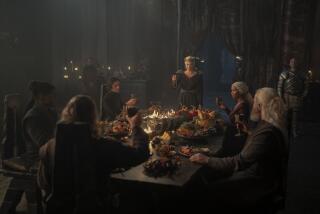Review: Is ‘Game of Thrones’ the best TV show ever?
- Share via
Although the weakest currency of criticism, superlatives have become a hallmark of television’s recent resurgence. Words like “greatest,” “smartest” and “funniest” are tossed about with the desperate regularity of Chuck E. Cheese tokens at a kindergartner’s birthday party.
So to say that “Game of Thrones,” which returns, roaring and snorting, for its fourth season on Sunday night, is the Best Television Show Ever isn’t just thoroughly subjective, it’s reductive. Despite our increasingly wearisome penchant for lists, television was never linear enough for meaningful comparisons; it is now so wildly diverse in form and function that any sort of ranking or award is all but meaningless.
But you know what? I’m going to say it anyway.
“Game of Thrones” is the Best Television Show Ever.
PHOTOS: Meet the ‘Game of Thrones’ cast without their costumes
The acting is sublime, the writing wicked sharp, the sets and camera work astonishing, and in terms of ambition, be it narrative, creative, logistical or geographic, no other series comes close.
With seven-plus kingdoms to manage and a literal cast of thousands, it seems inevitable that show runners David Benioff and D.B Weiss will somehow lose their way. Yet every season proves stronger than the last.
This is a show so chock-full of riches that it can afford to kill two of its most beloved characters — Robb and Catelyn Stark — in an episode that broke several million hearts and still move forward with ruthless beauty, rigorous control and a cast unparalleled in television.
Yes, there are men, mighty and fallen, though mostly an ever-shifting compilation of both. But unlike most quasi-historical fantasy epics, there are also women equally strong in their ability to stir admiration, hatred and concern. Who among us does not worry about all that Arya Stark (Maisie Williams) has been forced to endure; what woman doesn’t secretly long to be called “Khaleesi”? Me, I want it on a T-shirt.
Season 4 opens in the aftermath of that infamous “Red Wedding,” as the various participants — the now-reunited Lannisters, the Freys, the Boltons — contemplate their “bright” futures, while the remaining scattered Starks — Arya, Sansa (Sophie Turner), Bran (Isaac Hempstead-Wright), Rickon (Art Parkinson), Jon Snow (Kit Harington) — move grimly toward destinies once unimaginable.
PHOTOS: It’s not ‘Game of Thrones,’ it’s game of hosts
Winter is still coming (though, it must be said, a bit more slowly than was hinted at two seasons ago), the White Walkers are still risen and the Wildings — those who have long lived mostly outside the ken of civilized Westeros — have breached the wall intent on revenge.
And while King Joffrey (Jack Gleeson) and his Machiavellian grandpapa Tywin Lannister (Charles Dance) may believe they have secured the Iron Throne for good, well, off in distant lands, the dragons and armies of Daenerys Targaryen (Emilia Clarke) continue to grow while Stannis Baratheon (Stephen Dillane) still insists the throne will be his, if not through war than through magic.
Not everyone likes fantasy. It is by far the toughest genre: to make, to sell and to sustain. If you create, as novelist George R.R. Martin has, a world in which there be not only dragons and White Walkers but pathological boy kings and murderous red witches, half-paralyzed children who communicate with three-eyed crows and dwarf princes both wily and noble, you cannot afford too many missteps.
You really can’t make any when you take that vision to the screen. Nothing looks sillier than a fantastic alternative universe collapsing under the weight of its own fey pride.
For three years now, “Game of Thrones” has juggled a dozen plot lines set in as many wildly diverse locations, meticulously weaving a mythology that resonates with the modern world. The swords ‘n’ sorcery make it interesting, but it’s the astonishing range of themes — love and death, vengeance and loyalty, freedom and slavery, greed and generosity, power and submission, passion and compassion, parenthood and childhood and a single person’s responsibility to family, the gods, and the sweep of time — that make it great.
Superlatives may indeed be meaningless, but no matter how you choose to describe it, television just doesn’t get any better than this.
More to Read
The complete guide to home viewing
Get Screen Gab for everything about the TV shows and streaming movies everyone’s talking about.
You may occasionally receive promotional content from the Los Angeles Times.







